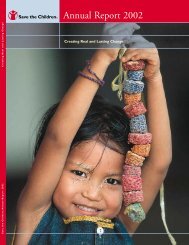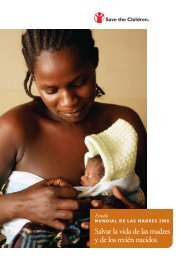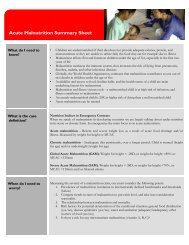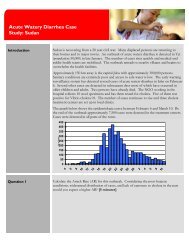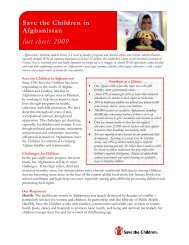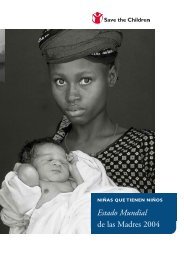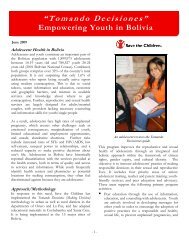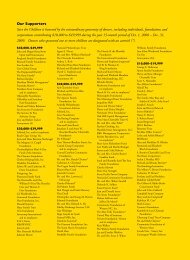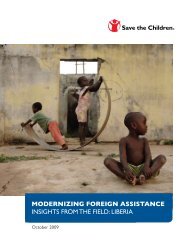Adolescent Sexual and Reproductive Health Toolkit for - UNFPA
Adolescent Sexual and Reproductive Health Toolkit for - UNFPA
Adolescent Sexual and Reproductive Health Toolkit for - UNFPA
Create successful ePaper yourself
Turn your PDF publications into a flip-book with our unique Google optimized e-Paper software.
4. Confidentiality must always be maintained,<br />
even when parents (or both adolescents <strong>and</strong><br />
parents) have provided consent.<br />
5. Institutions conducting assessments involving<br />
adolescents must be sensitive to the needs of<br />
adolescents <strong>and</strong> should have the appropriate staff<br />
<strong>and</strong> facilities to care <strong>for</strong> this population group.<br />
6. In circumstances in which researchers believe<br />
they are obligated to report adolescent<br />
behavior to any authority, the adolescent<br />
subject must be made aware of the possibility<br />
of such reporting prior to his/her involvement<br />
in the assessment.<br />
Other ethical considerations:<br />
In addition to the above, there are other important<br />
ethical issues that must be taken into consideration:<br />
• Approval<br />
Prior to conducting an assessment, it is important<br />
to obtain permissions from the body coordinating<br />
the emergency response (the Global <strong>Health</strong> Cluster,<br />
<strong>for</strong> example) as well as from national <strong>and</strong> local<br />
government <strong>and</strong> health authorities, community<br />
leaders <strong>and</strong> partner organizations.<br />
• Security<br />
The security of the beneficiary population <strong>and</strong> the<br />
staff should be of primary concern. If conducting<br />
the assessment could put the participants or the<br />
study team at risk, then the assessment should<br />
not be conducted.<br />
• Referrals<br />
The assessment (or sections of the assessment)<br />
should not be conducted if appropriate referral<br />
services are not available. For example, questions<br />
regarding sexual assault should not be asked unless<br />
there are medical <strong>and</strong> psychological services<br />
available to a participant who reveals that s/he<br />
is a survivor of sexual assault.<br />
• In<strong>for</strong>med consent<br />
In<strong>for</strong>med consent must be obtained from each<br />
individual involved in the assessment. The participant<br />
must be fully in<strong>for</strong>med of the purpose of the<br />
assessment, the methods that will be used, the<br />
nature of the questions that will be asked, <strong>and</strong> the<br />
risks <strong>and</strong> benefits of participating.<br />
• Participation<br />
Participation in an assessment is completely<br />
voluntary. An individual has the right to refuse to<br />
participate in the assessment <strong>and</strong> may decide to<br />
withdraw at any time. S/he may also choose not<br />
to answer any question without being pressured<br />
by the interviewer to respond. It is the obligation<br />
of the individuals or agency conducting the assessment<br />
to respect the wishes of the participant<br />
if s/he decides not to participate.<br />
• Privacy<br />
Data should be collected in a setting where privacy<br />
is ensured (both visual <strong>and</strong> auditory) <strong>and</strong> where<br />
adolescents feel com<strong>for</strong>table, so that the participants<br />
are more likely to respond freely to questions.<br />
Adults or older adolescents must not be allowed in<br />
the room during the interview. If the participant is a<br />
caregiver of a very young child, it is permissible<br />
that the child be in the room during the interview,<br />
but it is preferable that other arrangements to care<br />
<strong>for</strong> the child be made if possible.<br />
• Confidentiality<br />
The assessment team has the obligation to maintain<br />
the confidentiality of the participants at all times<br />
be<strong>for</strong>e, during, <strong>and</strong> after the assessment. Members<br />
of the assessment team must not discuss any<br />
aspect of the assessment, except with the study<br />
supervisor, if clarification is needed. The identities<br />
of the participants must be guarded <strong>and</strong> must not<br />
be linked to the responses that they provide. The<br />
participants’ responses must not be discussed<br />
anywhere, with anyone except with the study<br />
supervisor if clarification is needed. If questionnaires<br />
are used, they must not contain in<strong>for</strong>mation<br />
that could be used to identify the participants, <strong>and</strong><br />
they should be kept in a locked cabinet; if there is<br />
any risk that the questionnaires might endanger the<br />
participants or the staff in the future, they should<br />
be destroyed once data analysis is complete.<br />
54<br />
<strong>Adolescent</strong> <strong>Sexual</strong> <strong>and</strong> <strong>Reproductive</strong> <strong>Health</strong> <strong>Toolkit</strong> <strong>for</strong> Humanitarian Settings



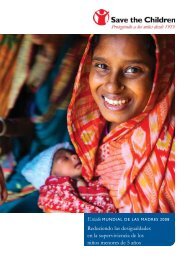
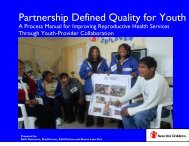
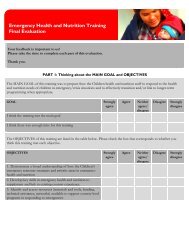
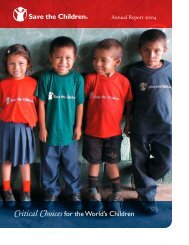
![View full document [PDF 3.39 MB] - PreventionWeb](https://img.yumpu.com/27308954/1/190x245/view-full-document-pdf-339-mb-preventionweb.jpg?quality=85)
